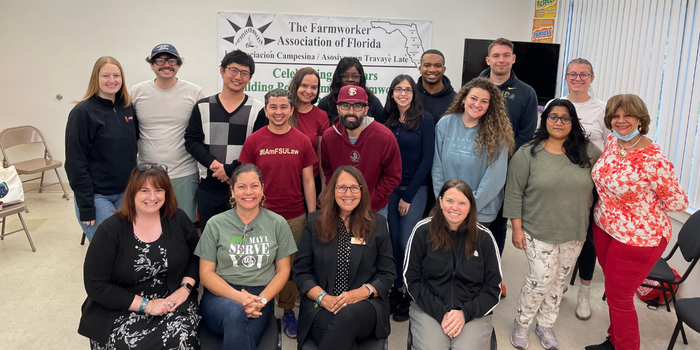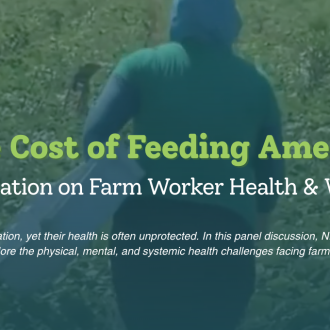
Written by Ashley Hoyt, law student at Florida State University
It may be surprising, but the food we eat doesn’t just grow on trees and then magically appear in the store. National Farmworker Awareness Week is March 25-31, and although this is a special week to recognize farm workers, we need to show our appreciation in more profound ways year-round. To truly appreciate farm workers, we must increase protections to safeguard their health and livelihood.
Annually, a select group of Florida State University College of Law students travel to Apopka, Florida, to experience an “Alternative Spring Break.” With the enormous help of the Farmworker Association of Florida, students learn about the lives of farm workers and the legal issues that impact them including immigration barriers, environmental harms, and labor trafficking.
Large-scale agriculture began in Apopka in the 1940s. Then, central Florida’s farm workers were primarily African American. After decades of extensive chemical and pesticide use in the area’s commercial agriculture, Lake Apopka’s ecosystem collapsed, and Black farm workers and their descendants were left impoverished with ill health effects. While governmental efforts have been made to address the ecological collapse of Lake Apopka, such efforts have not been advanced to rectify the harms suffered by workers.
 Subsequently, the demographic of Apopka’s farm workers shifted and now most workers are Latin American and Haitian. Although pesticide application in commercial agriculture faces more stringent regulation in modern times, many farm workers—especially those at higher risk of exploitation due to language and immigration barriers—still regularly face dangerous exposure. Further, farm workers laboring for long hours in the hot Florida sun lack ready access to water or breaks, which can lead to detrimental effects on the body. The Farmworker Association of Florida’s peer-reviewed studies, conducted with the participation of Apopka’s farm workers, confirm the negative health effects of such prolonged heat exposure.
Subsequently, the demographic of Apopka’s farm workers shifted and now most workers are Latin American and Haitian. Although pesticide application in commercial agriculture faces more stringent regulation in modern times, many farm workers—especially those at higher risk of exploitation due to language and immigration barriers—still regularly face dangerous exposure. Further, farm workers laboring for long hours in the hot Florida sun lack ready access to water or breaks, which can lead to detrimental effects on the body. The Farmworker Association of Florida’s peer-reviewed studies, conducted with the participation of Apopka’s farm workers, confirm the negative health effects of such prolonged heat exposure.
Florida’s situation is not unique. Farm workers all over the country face similar realities. According to the CDC, agriculture is one of the most dangerous industries, yet the Occupational Safety and Health Administration does not provide protections for farm workers. The state of Florida does not regulate heat and sun exposure for agricultural workers, despite being home to one of the largest agricultural industries in the nation. Despite the well-documented health dangers posed by heat, farm workers face many barriers to healthcare.
FSU Law Alternative Spring Break students asked farm workers how they can best serve their community as future attorneys. The response was simple: “Have empathy and compassion. Listen to our stories and recognize our humanity. Treat us with dignity.” We, as state and as a nation, are strong enough to stand with farm workers to help ensure that these most essential workers are treated with the compassion, dignity, and respect they deserve. It’s nice to honor farm workers for one week every year, but we should honor them all fifty-two weeks of the year by providing them the most basic of legal protections such as access to clean water and breaks from the sweltering heat. To echo the famous slogan of United Farm Workers, ¡Sí se puede! Yes, we can!

About the Author: Ashley Hoyt is a second-year law student who has attended FSU College of Law’s Alternative Spring Break program twice, serving as Program Coordinator in 2023.



